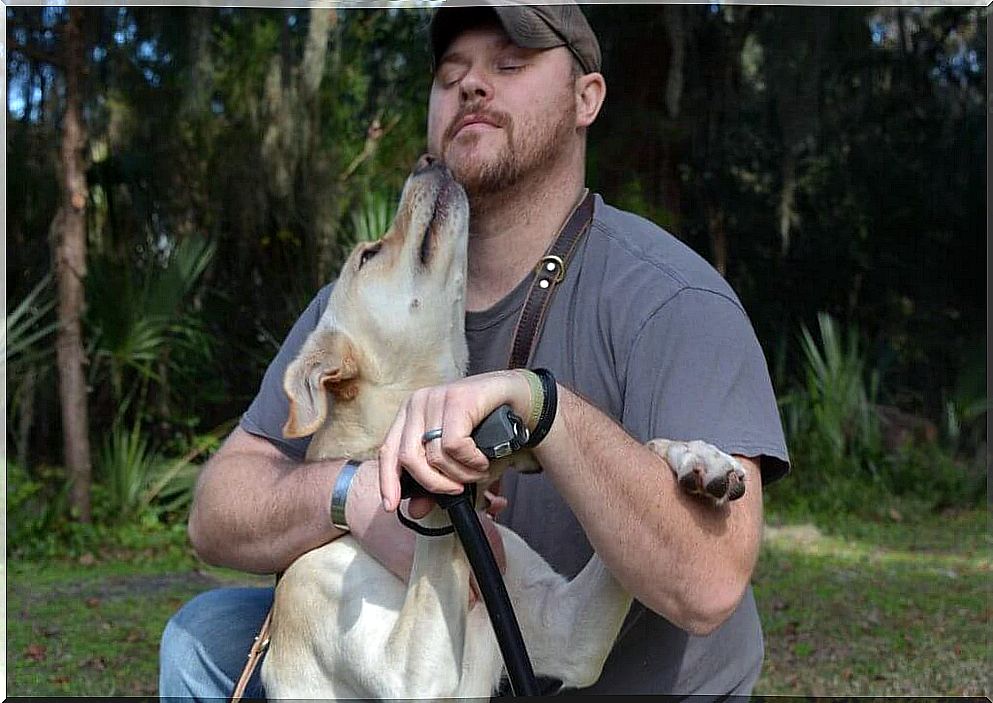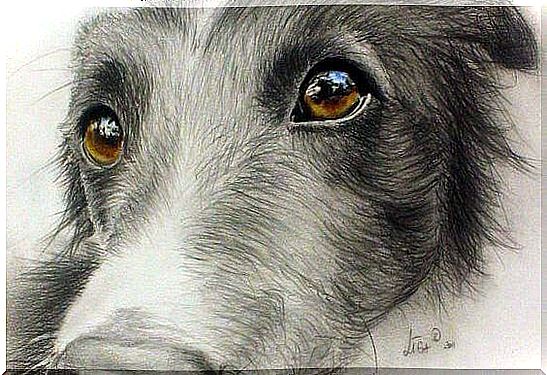Dog Empathy: A Healing Power

Science managed to demonstrate something that many people already knew: the empathy of dogs. Dogs connect with people’s emotional state almost immediately. However, their abilities go a little further than this fascinating connection because they also demonstrate an expressed and unselfish desire to offer comfort, to alleviate emotional anguish and sadness.
We know that anyone who has one or more dogs will agree with the conclusions reached in this study carried out at the University of London on this topic. We know that these four-legged, wet-nosed, faithful-eyed friends are immediately attuned to our joy and, above all, to our sufferings. That’s why they don’t hesitate for a moment to lick our hand, put their favorite toy at our feet, or sit on our lap like children trying to steal a smile from us.
Dog empathy, this skillful reading of our moods, actually has even more startling nuances that are explained in this same study. An example of this can be seen in a very specific case. Benjamin Stepp is a war veteran, he was in the Iraq war and now lives with a beautiful Labrador named Arleigh. This young man has suffered a traumatic brain injury that every day appears in the form of sudden attacks of pain that immobilize his legs.
Arleigh senses when these attacks are going to happen and immediately goes to the owner with a very specific goal: to be supportive, caring, reduce anxiety and control her breathing so that the pain goes away as quickly as possible. This relationship between the two is so fascinating that an ethologist, Natalia Alburquerque, is studying the case. It is known that puppies “smell” certain metabolic changes in our body that translate, for example, into drops in blood sugar, epilepsy attacks and, in this case, the onset of pain.
However, one of the most surprising aspects of all this is the loyalty and altruism of these animals. They don’t want anything in return, their sense of protection and their connection are so intense that the mere fact of providing relief and well-being is already gratifying for them and leaves them satisfied.

Emotional contagion in dogs, a primitive form of empathy
Ethologists and psychologists specializing in the animal world show us an important point. We cannot compare human empathy with dog empathy. In the latter case, it is preferable to speak of an “emotional contagion” , a very primitive form of empathy and which, according to Ted Ruffman, a psychologist at the University of Otago, could be compared to what, for example, a three-year-old child can have .
It must also be taken into account that empathy is a complex psychological dimension in which very sophisticated cognitive processes are at work. In dogs’ empathy, what stands out is the facility they have to read our facial expressions, our tone of voice and the natural attitude of emotionally “infecting” with the same states that we are. However, if this emotion is negative, they immediately initiate voluntary behaviors to offer help, support, and well-being.
This last aspect is, without a doubt, a theme that has always fascinated specialists. The reason why dogs show such a strong bond with us can be found in our ancestors, in our most primitive past. Edward Osborne Wilson is an American enthologist and biologist who explains really interesting aspects in his multiple works.

Dogs and humans: a very old bond
The human being has established a very intense emotional bond with dogs since the most remote times, those in which our top priority was to survive. One of Dr. Edward Osborne’s theories is that those humans who had the company of several dogs in their social groups were more likely to stay alive than those who had not yet established that bond.
- Having had one or several dogs in our first social settlements meant being more united with nature, its cycles and also finding more resources with which to survive: water, hunting, edible plants… In fact, there are several cave paintings in which you can see that kind of interaction.
- The company of these animals gave us from a very early age a very relevant type of vital satisfaction, forming a bond in which countless biological mechanisms were involved.
- It is known, for example, that looking into a dog’s eyes causes our brain to release oxytocin, the hormone of affection, care and bonding.
This constant interaction started from those earliest times established a sophisticated relationship in which dogs were quick to recognize our emotions and in which we learned to see them as members of our social groups. The empathy of dogs is a reality that has always accompanied us.

Just look at a dog to smile immediately
Our dogs will never tell us to take things any easier. They won’t tell us to change jobs, to give our ex another chance, or to no longer care about that friend who brings us more problems than benefits. They will never recommend anything, will not judge or criticize any of your decisions. Your dogs will simply “be” there with you, giving their best for nothing. And what would be one of the clearest empathetic behaviors in dogs?
As curious as it may seem, this is what they have always done: live with us since the time of our ancestors. European hunter-gatherers began to domesticate the offspring of the more docile wolves that prowled their settlements in search of food. We made them our own and they took us for themselves in a wonderful and lasting alliance. That’s why most people can’t help but smile when their eyes meet a dog’s.

In conclusion, questioning the emotional power of dogs and their ability to empathize is certainly an unforgivable mistake. Because in them we have our anonymous four-legged heroes to whom we are so indebted: the guide dogs, the dogs that accompany children with disabilities or dependent elderly people on a daily basis. In short, all those great friends that we adore and that we don’t hesitate to consider as an indisputable part of our family.









